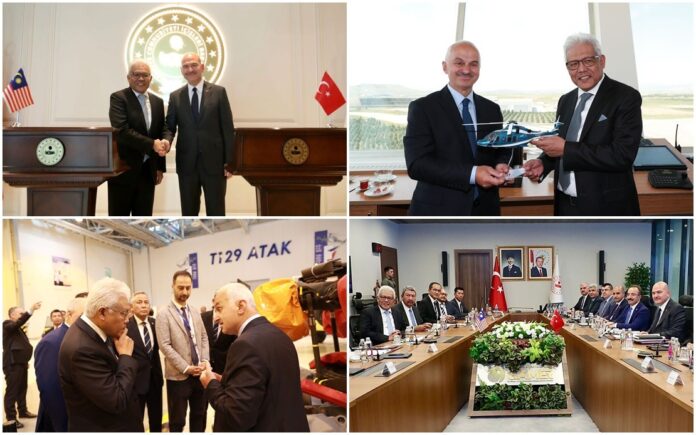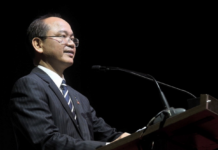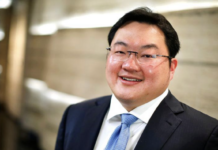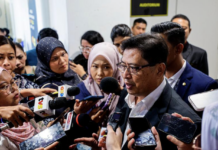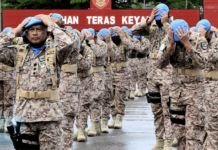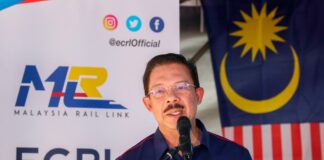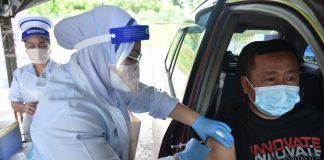ISTANBUL, June 8 — Buoyed by Turkiye’s border managment that ensures security inside the country, Home Minister Datuk Seri Hamzah Zainuddin said Malaysia has so much to learn from such systems that Ankara has developed over the years.
Wrapping up a week-long trip to Turkiye, where he visited border areas with Syria, Iraq and Greece, besides command-and-control centres, Hamzah told Anadolu Agency in a detailed intervierw that Malaysia would like to learn from Turkiye on refugee control, share experiences in tourism and preservation of historical sites and strengthening people-to-people exchanges, among others.
Amid changing local and global politics, Hamzah also urged stronger political leaderships inside Muslim nations besides unity and solidarity among political parties, which, he said, will yield better results for those countries.
Malaysia, he said, would like to play a role in struggling for a better world where it would work with everyone.
Here is the full interview:
Lauding the closer relationship between Turkiye and Malaysia at the highest levels, Hamzah said Turkiye and Malacca were “actually two Muslim countries that had been working together in many, many sectors” in their shared history of 500 hundred years.
“Because Malacca (peninsula) had been a trading nation those days, and Turkiye (Ottoman State) had been superpower those days,” he said, adding that formal diplomatic relations established in 1964 “became into another level of an understanding” between the two countries.
“In the current situation where the world economy is changing, when superpowers are playing into their own agenda, we in Malaysia feel that we also need to work closely with not only other countries but also with Türkiye, as the two brotherly countries have been working for the last 500 years,” the Malaysian minister said.
At the outset of his official trip to Ankara, Hamzah said, he called on Turkiye’s President Recep Tayyip Erdogan, during which he briefed the president “about our problems especially on managing our border,” the visiting minister said.
According to Anadolu Agency, the Malaysian minister was flown to Turkiye’s border areas with Syria and Iraq and later on sailed through waters to witness maritime border management with Greece.
“There, the (Turkish) government officers showed me how they manage, how they plan to provide, not only in terms of physical surveillance; they’re also using technologies, there, at the border,” he said, recalling his experiences.
“They (have) built concrete walls, they (have) built roads, they provide lightning along the border and all these issues… the importance of having proper management of border control,” said Hamzah.
He had also visited Türkiye’s command-and-control center of the border management system.
“Alhamdulillah!” Hamzah said about his experience after visiting the centre.
About his visit on a border trip with Greece and Bulgaria, the minister said Turkish officials took him aboard a boat “to go exactly at the border between Greece and Turkiye.”
“That is where I saw Turkiye took it very, very serious on controlling the border,” he said.
Given the geopolitical situation of this region, the Malaysian Home Minister said, “There are many interested parties or countries (which) would like to have their base in this region.”
“Because of that, Turkiye has come up with a policy to strengthen their security and defense situation of that area,” he added.
“To do that, you have to have proper technologies, proper assets, and they (have) developed this kind of assets and industries (to) make sure that they have a sustainable defense mechanism in the future,” he said.
“I salute them. I would like to congratulate Turkiye for having a farsighted policy in terms of defending the country… (a) sovereign country and also the security,” he told Anadolu Agency in the interview.
After the trip, Hamzah said he discussed with his Turkish counterpart Suleyman Soylu that “there are a lot more things that I have to learn from Turkiye.
In Istanbul, the minister said, he visited the government-run call centre, which has “integrated seven departments including health, forests, fire department which use just one number, i.e. 112.”
“And I am quite impressed with all that.”
He said Turkiye and Malaysia “used to have just a normal understanding” until now.
“I’m going back to come up with a very comprehensive kind of agreement between two countries, especially on security… how to manage our borders, and how to actually create and manage securities in our country,” Hamzah said, adding the two countries are expected to sign such an agreement in next few months.
‘Historic bond to boost current relations’
The Malaysian minister acknowledged that the pandemic had slowed down the implementation of Memorandums of Understanding (MoUs) signed between Turkiye and Malaysia in the defense sector.
“The COVID-19 certainly created a lot more problems. We are working on those again because that’s the reason I have come here,” said the minister, referring to some 14 MoUs signed between private Turkish and Malaysian companies in defense areas in 2019.
“Looking at the good and the positive sides, we are really planning on what to do immediately after if the pandemic is being resolved. And we can just start moving,” he added.
The Malaysian minister also visited Turkiye Aerospace Industries.
“I really admire what they have done in the last 20 years,” said the minister of Türkiye’s progress in the defense sector in the past two decades.
He recalled that in 1996, “a group of professionals was sent from Türkiye to Malaysia to learn from us how to make composite material for the aerospace industry.”
“That was in 1996. I think they got inspired about what we had at that time,” the minister said about the Turkish delegation.
“After 20 years, I could see that they have moved far faster than what we had before,” he said.
Hamzah also suggested that Türkiye can benefit from Malaysia’s joining of the world’s biggest trade alliance – the Regional Comprehensive Economic Partnership (RCEP).
“With so many other agreements that we have like the RCEP, Turkiye should take this as an opportunity to work closely with us. And that is a big, big market there,” he said.
The RCEP is a regional free trade agreement among 14 nations in the Asia Pacific.
On his visit to Hagia Sofia Mosque, which was opened for Muslim prayer in 2020, the Malaysian minister said: “Everybody was so happy that after so many years, Türkiye opened that mosque to have prayers.”
“I realised that it is not only Turkish people who come and pray there. There are many other people coming from other parts of the world, coming and praying there.”
“Historical values are so important to human beings,” he said, adding: “history is the domain of civilization.”
“That will actually create values. So many years ago, Malacca was so famous that everyone would not only like to visit Malacca but to attack Malacca and take control of Malacca. And same thing here in Turkiye,” he said.
He said people of the two countries share “similarities” and “we can work together and people should visit each other’s country.”
He said Malaysia boats of “all cultures of the ASEAN.”
“Malaysia is truly Asia.”
Likewise, he said, “I went to Edirne (province of Turkiye), where I could see the values, the preservation of all the historical relics they have. I am quite amazed. There are so many things we can work together.”
‘Rohingya issue is about identity’
Regarding solving the issue of the inflow of Rohingya refugees, the Malaysian minister said the country is not a signatory to the UN’s Refugee Convention.
“It is on the humanitarian grounds that we allow them to be in Malaysia,” said Hamzah.
However, the minister added that no one can “just enter” Malaysia without following the laws.
“When I say the law, it doesn’t mean that they just can come in, as they do whatever they like.”
“The real problem that we are facing is not about those who are breaking all those laws. The real problem that we are facing is actually on undocumented people,” he explained.
Rohingya have been defined as the most persecuted community people by the UN who are forced to flee their home country – Myanmar. Thousands of them live in Malaysia.
“We would like to make sure that those people who stay in our country have their own identity in order for us to understand where they are… where they stay… where they work and all that,” said the Malaysian minister.
In Malaysia, the minister said not all Rohingya are registered.
“Our agency, the Coast Guard, managed to catch a few boats (carrying Rohingya people. When we took them to land, we found out they have only got the UNHCR card,” he said, referring to refugee cards issued by UN Refugee Agency.
“Is that fair for someone to give the card before even landing in our country… in Malaysia,” the minister asked. “That is not fair… Currently, they (have) only issued about 200,000 cards. But that’s the beginning.”
“This is the biggest issue that I’m having a problem with UNHCR.”
He said it is only the National Registration Agency of Malaysia that is authorised to issue identity cards.
“The issue about Rohingya is more (of) identification. Who are they?” It was during the 1980s when the Vietnam war happened and many from the war-hit Southeast Asian country fled to Malaysia.
“And at that time, we allowed the UNHCR to have a base, a temporary office… An agreement was just temporarily for them to just open an office. But they are staying for many, many years,” he said.
Hamzah said Malaysia would “like to see how Turkiye managed that kind of problem and that’s the reason I also had a discussion with my dear brother Suleiman Soylu.”
“I said (if) they are producing their own identity card, they will come up with their own passport, proper passport and all that,” said Hamzah.
He added Malaysia was the first country in the world to “produce electronic passports.”
“We’re the first one; that was in 1998.”
To resolve the Rohingya issue, the Malaysian minister called for “identifying the real refugees.”
“Secondly, is to go into the international way of having cooperation between Myanmar and Malaysia, to accept them back,” he said, suggesting using the regional mechanism like the Association of Southeast Asian Nations (ASEAN).
“We can talk to them (Myanmar) and say why don’t you bring them back, and probably (ask) to United Nations to accept the Rohingya back into their own country,” he said.
To do that, he added: “we must identify those who are actually in Malaysia.”
On whether ASEAN, where Myanmar is also a member nation, failed to help resolve the Rohingya issue, the Malaysian minister said: “We cannot make any judgment at the moment.”
“If we say that ASEAN failed on this issue, should (we) also say the United Nations failed on so many other issues,” he questioned.
“Failure is when you know the exact time being given to any other countries to resolve these kinds of issues,” he added.
He said ASEAN should be allowed to talk to Myanmar and tell it, “you are actually not only looking internally into your country, but you must also look at the refugees coming from your country to your neighbouring countries like Malaysia that (has) become our social problem.”
He also pushed ASEAN to appoint a special envoy “to go to Myanmar and talk about it.”
“And that this has become a security problem, not only to Malaysia but also all ASEAN countries,” he said.
‘Need for stronger leadership, political stability in Muslim nations’
Pointing to the Muslim majority nations, Hamzah said: “We should look into all Muslim countries (and) kind of problems they are facing.”
“You look at leadership crisis, political stability and economic sectors,” said the Malaysian minister.
“We, a few countries of us, can just take the lead and bring them back to a certain level where everyone should be happier living in this world, especially when the world is getting bigger, bigger in a sense that everyone should learn from each other in terms of values, culture and attitude that would make the world better,” he added.
On evolving political environment in Malaysia, Hamzah said: “I am very positive and optimistic that Malaysia can reach another level again when all of them (political leaders) really sit down, forget about problems of the past and give priority to the nation.”
“Paramount importance for any country is to not have leadership crisis and to do that all the leaders must sit down and say now one of us got to take the lead,” he added.
“Insha Allah, we can reach another level if everyone can sit down and unite and use that as solidarity for Malaysia to go far beyond what we have today.”
Referring to geopolitical changes in Asia-Pacific, the Malaysian minister said: “Our policy in terms of geopolitics is to work with everyone.”
“The most important thing is about the understanding of working together for everyone, the citizen of the world (should) really looks at the world as one,” he said.
“To do that, Malaysia would like to play a role in sharing whatever we have to learn from each other. What we need is to have a safe world for everyone to live together.”




